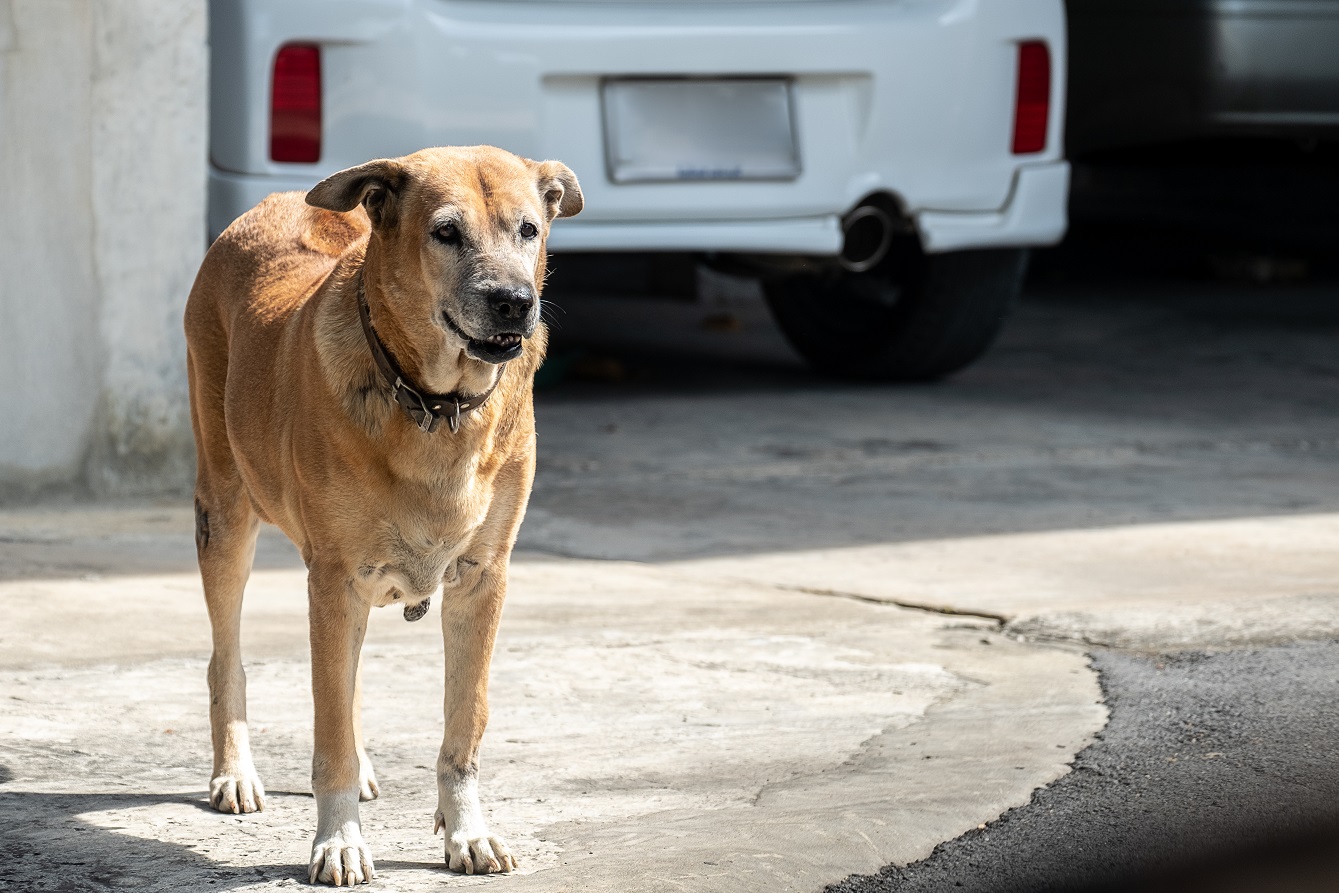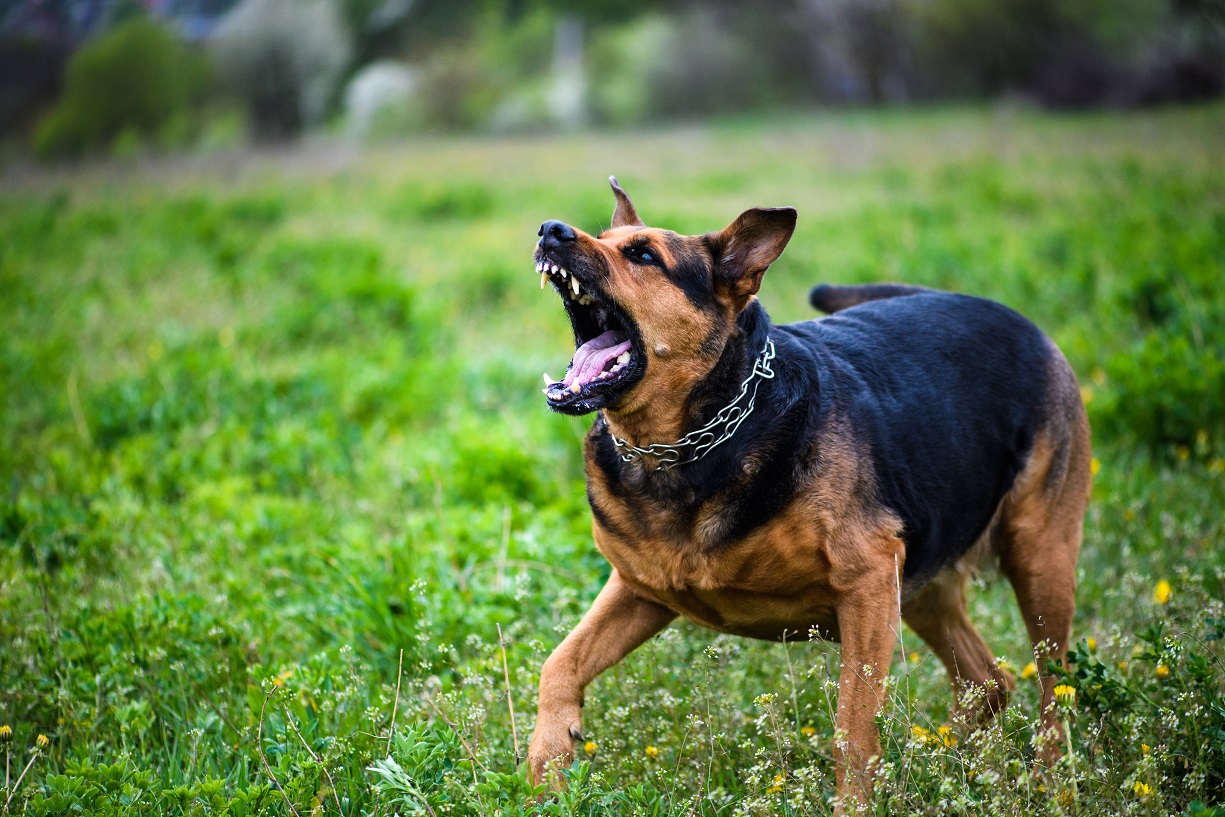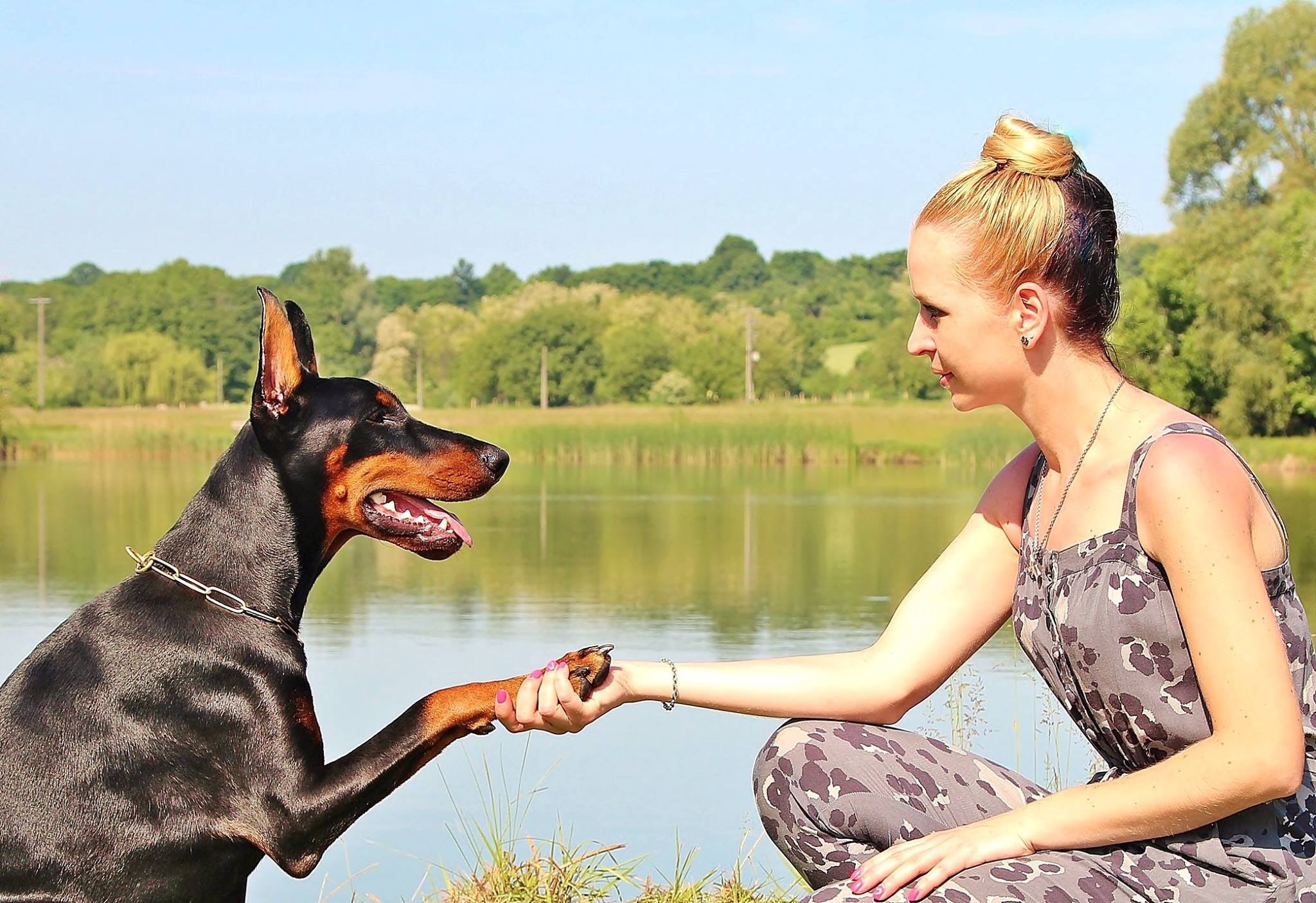If you’re asking yourself, ‘why does my dog bark at me and not my husband,’ you’ve come to the right place.
Let’s face it, a constantly barking dog is a nuisance regardless of who or what they’re barking at. Even if you don’t mind the noise, it’s doubtful your neighbors feel the same.
It’s loud, it’s annoying, and it’s worrying. Sure, we all know it’s natural for dogs to bark (after all, how else would they communicate if they didn’t?)
But there’s a world of difference between the occasional bark of a dog saying hello and the incessant, never-ending bark of a dog that doesn’t know the meaning of quiet-time.
When all of that barking is directed your way, it becomes even more stressful.
- Do they not like you?
- Have you done something to annoy them?
- Are they scared of you?
At this point, you’ve probably got all those questions (and a whole lot more besides) spinning around in your head.
Ultimately, your dog might be barking at you for one of several reasons. We’ll look more into those reasons (and some of the solutions) shortly.
In the meantime, there’s one thing I need to introduce you to before anything else. It’s a video from Dan Abdelnoor over at the Online Dog Trainer.
In the video below (which I’d recommend you bookmark asap), Dan runs through 5 step-by-step calming exercises that are designed to teach your dog how to be calmer and more attentive.
Used regularly, the exercises will provide the perfect foundation for your training.
The sooner you can start implementing them, the sooner you’ll start noticing a marked improvement in your pooch’s problematic barking.
Here’s the video link to take a look: 5 Step-By-Step Calming Exercises To Quickly Stop Your Dogs Annoying, Frustrating Barking Habit…
(video will open in a new window)
Why Does My Dog Bark At Me And Not My Husband?
It’s normal for a dog to bark. What’s not quite so normal is for a dog to bark non-stop. And when all that barking is directed at just one person, it can get old, fast – particularly if that person is you.
Not only is excessive barking noisy, but it can actually be a little scary. After all, barking is often one of the first warning signs of aggression.
Obviously, not all barking leads to violence. But even so, this isn’t a problem you can afford to take lightly.
If your dog’s barking, they’re doing it for a reason. The sooner you can figure out that reason, the sooner you can bring the problem to an end.
So, why exactly do dogs bark? And why might they bark at one person more than most?
Playful Barking
Not all barking is something to worry about.
If your pooch is happy to see you or you’re in the middle of a fun game, it’s only natural for them to let out a little bark of excitement.
Fortunately, it’s pretty easy to tell the difference between playful barking and non-playful barking.
How?
…Use your eyes. Dogs don’t conceal their body language.
If they’re happy, you’ll notice they have a loose, relaxed posture. Their tail will be dancing a jig, and their yelps will be high-pitched and ‘happy’ sounding.
Non-playful barking is typically accompanied by a rigid posture and a tense muzzle. These kinds of barks will usually be low, deep, and distinctly menacing.
If your dog tends to bark at you when you come home from work or when you’re in the middle of a game, and if their body language remains loose and relaxed, you’re probably looking at a simple case of play barking.
Playful barking can sometimes escalate, but providing it doesn’t become uncontrolled, and your dog isn’t displaying any worrying behaviors, there’s no need to panic.
Territorial Barking
Dogs are territorial animals.
If an ‘intruder’ enters a dog’s territory, it can trigger their fear response… something that’s usually a one-way ticket to barking, snapping, and other aggressive behavior.
If a dog’s territory began and ended with the yard, it would be one thing. The problem is, dogs have a very loose definition of ‘territory.’ They might see a car, the house, the street, or even a person as their territory.
So if they’ve come to think of your husband as their territory, they won’t appreciate you getting between them and him. And if the barking tends to increase when you and your husband interact, it could be that they’re warning you to back off.
Related Post: Why Is My Dog Aggressive Towards One Child? – Dealing With Aggression

Attention-Seeking Barking
If your dog seems to be barking at you for no particular reason that you can see, they could simply be looking for attention.
Dogs only have a limited number of ways to attract our attention. Barking is one of the most effective. If they want a snack, to go outside, or just a bit of one-on-one time, they’ll often try to alert us to the fact by barking.
Ultimately, demand barking isn’t desirable. Unfortunately, it’s all too easy to encourage it.
Whenever you reward your dog with any kind of attention when they bark, you’re reinforcing the behavior. And once they figure out their ploy works, they won’t stop.
If they only bark at you rather than your husband, they might see you as the easiest touch.
If your husband ignores the barking rather than acknowledges it, they won’t waste their time bothering him – they’ll just get what they need from you instead.
Fear Barking
Dogs will often bark when they’re afraid. Essentially, it’s a warning. It’s a sign that they want the thing that’s scaring them to go away.
If it doesn’t, they may be forced to protect themselves.
Before you start beating yourself up for making your dog scared of you, don’t. In all likelihood, their fear hasn’t been caused by anything you’ve done.
If you use a medical device like a cane or wheelchair, it could be that the device is causing the fear.
If your pet is a rescue dog, there could be something about the way you look or even smell that reminds them of a bad past experience.
Protective Barking
Protective barking is a form of resource guarding.
If a dog sees a certain member of the family as a valuable resource (usually, this will be whoever controls their access to food, water, and affection), they’ll start ‘guarding’ them.
Think about who tends to feed, walk, and play with your dog the most. If it’s your husband, and if they only tend to bark when you interact with him, they may be guarding him.
This might seem sweet, at least from your husband’s perspective. Your dog loves him so much, they don’t want to share him.
But it’s not sweet. It’s potentially very dangerous. When your dog barks, they’re giving you a warning.
And if they don’t feel you’re taking heed of that warning, the barking could eventually escalate into something much more serious.

How to Stop Your Dogs Obsessive Barking
If your dog’s barking has become a problem, you need to take action. Because left unchecked, troublesome barking can often escalate into a bite.
The sooner you can nip the problem in the bud, the better chance you have of avoiding a potentially dangerous situation occurring.
Before we look at some of the methods you can use to address the issue, take a moment to revisit those 5 step-by-step calming exercises I introduced you to earlier.
All excessively chatty dogs have one thing in common. They all need to learn how to take control of their emotions.
These 5 exercises will help you teach your dog to calm down, focus, and become the master of their emotions.
They’re also going to do a great job of teaching your dog to respect your status as a leader… something that’s going to be crucial as you work your way through the following steps.
Rule Out Any Medical Problems
If your dog starts barking excessively or displays any signs of tension or insecurity, speak to your vet before anything else.
Occasionally, behavioral problems can be the result of certain illnesses or conditions that can cause pain or even affect a dog’s sensory functions.
If a medical problem is identified, your vet will work with you to manage it.
And if they suspect the problem is rooted in anxiety rather than a pathological cause. They may suggest anti-anxiety medication to help on a short-term basis as you work on addressing the behavior through training.
Avoid Negative Training
Establishing yourself as a leader is one thing. Establishing yourself as an authoritarian dictator is another.
Obedience and good behavior come about as a result of mutual respect… something that never comes through fear.
Some dog trainers use methods of ‘establishing dominance’ over a dog. If you meet a trainer like this, run a mile. The techniques they use are meaningless, dangerous, and counterproductive.
Using punishment or aggressive training techniques will simply provoke negative feelings in your dog and lead to stress, insecurity, and fear.

Build a Bond
Whatever behavior modification techniques you use, make sure they’re positive.
Positive reinforcement techniques will strengthen the bond you have with your dog. Something that’s going to prove vital if you want them to obey you and to begin demonstrating healthier behavior.
Reward good behavior whenever you see it. If you can teach your dog to recognize good behavior through the use of praise and treats, you’ll stimulate their social and emotional capacity.
Remember, dogs are quick learners – once they discover that certain types of behavior result in treats and attention, they’ll be motivated to repeat it.
As well as rewarding any good behavior, try to spend more quality time with your dog. Training, games, a run at the park… if there’s an opportunity to spend time together, take it.
Exercise, Exercise, Exercise
Exercise isn’t a cure-all, but you’ll be amazed at the difference it can make.
A bored, sedentary dog is one prone to frustration and bad behavior.
A well-exercised, mentally stimulated dog will be happier, healthier, and altogether better behaved.
Don’t underestimate just how important exercise can be for bonding, either. At this stage, spending as much quality time as you can with your dog is crucial.
A walk around the park, a game of frisbee, or even an agility class are all great ways to nurture the relationship.
Become the Good Cop
To help win your dog over, you’ll need to take on the role of good cop. Let your dog know you’re the bringer of great things by:
- Feeding them their meals
- Being the one to offer them treats
- Giving them toys and playing with them
- Engaging them in enjoyable activities
The aim is to get your dog to think of you in a good light. The more you can do to encourage positive associations, the better.
Take Control
Teaching your dog to take control of their emotions is a huge step in the right direction. Again, using methods and aids like these 5 step-by-step calming exercises will provide an excellent foundation to work on.
Once your dog understands how to stay calm and in control, you should notice a dramatic improvement in their behavior.
But remember, your dog isn’t the only one who needs to learn emotional control. Unless you want to make the situation worse than it already is, you’re going to need to do the same.
Obviously, being the subject of your dog’s bad behavior is frustrating – even more so if they’re as nice as pie to everyone else. But don’t let those frustrations get the better of you.
Dogs are like mirrors. They pick up on our energy and emotions and replicate them. If we’re anxious and stressed and prone to letting our frustrations show, they’re going to do the same.
So remember to stay calm above all else. Instead of shouting or scolding, keep your body movements relaxed and your voice firm but gentle.
It’s a big ask, but the more you practice, the easier it’ll become.
Related Post: Help! My Dog Is Aggressive Towards Me But Not My Husband

Final Thoughts
It’s easy to humanize our dogs. We share our homes with them, our lives with them, and our feelings with them. But a word to the wise – dogs aren’t people.
They don’t do things for the same reasons as us, and they certainly don’t feel the same things. If you’ve convinced yourself that your dog ‘hates’ you because of their behavior, it’s time to rewind.
Whatever’s behind your dog’s behavior, it’s not hate. Or any other human-specific emotion, for that matter.
Leave your emotions to one side and figure out the real reason for your pooch’s behavior.
Once you do, you can get to work on addressing it.
With time, patience, and plenty of good old-fashioned perseverance, you’ll soon have the problem under control.

